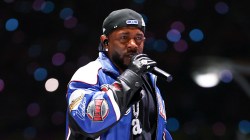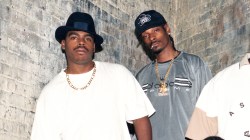Deborah Mannis-Gardner, founder of DMG Clearances, was instrumental in securing the necessary sample clearances in order for De La Soul’s catalog to finally appear on streaming services on Friday (March 3).
Mannis-Gardner is a music business veteran who has been clearing samples since 1990, then as an employee of a company called Diamond Time.
“I had a couple British flatmates that actually turned me onto Hip Hop and rap, and I really fell in love with it, because I was into punk rock, and I really felt that there was a similarity in being rebellious, if you will,” she told HipHopDX.
After working in-house at RCA Records, she struck out on her own creating DMG Clearances, where she has cleared the work of everyone from Redman to Drake.
“Now, there’s 13 of us, and half you do sample clearances, and half you [handle] sync and new technology; Metaverse, NFTs, podcasts, and video games, and all of Grand Theft Auto, and just having a blast,” Mannis-Gardner said. “But samples was really my love, my baby. I think even to this day, now, I think it’s one of the hardest things, and people just take it for granted.
“They call it stealing and all the negative stuff they say. It’s an art. The fact that you could take a bass line from a song, put it into a new one, change it up, chop it up, slow it down, and make it work, that’s an art. That’s an amazing skill.”
After many years in limbo, De La Soul’s Tommy Boy-era recordings like 3 Feet High & Rising, De La Soul Is Dead, Buhloon Mind State and The AOI series are finally available to stream and purchase on vinyl, and Deborah Mannis-Gardner spoke with HipHopDX about the labor of love in getting hundred of samples cleared and how that process enhanced her relationship with the group.
HipHopDX: When was the first time you heard De La Soul?
Deborah Mannis-Gardner: Okay, so back in the day, a good dear friend of mine, Michelle Bayer, worked at Tommy Boy Records. When I was at Diamond Time, we handled the clearances for De La Soul. A lot of the De La Soul stuff was handled in-house in the very beginning because that was Tommy Silverman, and he was doing everything himself.
And then eventually, I started doing clearances. But De La Soul was this band that was [indicative of] how sampling was done back in the ’90s. And Reggie — Redman — used to do the same thing where he had eight or 10 samples. Go back and look at the original Common stuff from his first album, where they would have five or six samples; a chord hit from this, a drumbeat from that, a vocal from this. And they [used] these snippets as additional elements.
Again, it goes back to making a stew, or something to that effect. And that’s what De La Soul was. They were taking little bits and pieces and creating music. They were using it as seasoning to the stew, if you will. So, that’s how I first heard about them. And then I’ve always been a fan.
So, what didn’t happen back then that necessitated you having to clear things now, for the catalog to be on streaming?
I think again, it was Tommy Boy that oversaw the clearances for the first album and such. And they did clear a lot of samples, [but] they didn’t clear every sample. If you think back to the way we used to do things, in that era of time, drum beats, a lot of drum beats weren’t cleared, because they thought it wasn’t copyrightable.
And it wasn’t until much later where people said, “Well, if you lifted it, you had to clear it, but if you replayed the drum, you didn’t necessarily.” There were labels that would argue that in court. Sometimes they won, sometimes they lost. There were no rules. We didn’t have a rule book. So, I don’t think there was ever malicious intent. I think people just did what they thought was supposed to be done back in those days.
And as for streaming, that’s argumentative. The argument is that those agreements did not include streaming rights, and therefore it couldn’t go up onto sites for streaming. I was arguing back, “Well, first of all, some of the deals we did, which were all media buyouts, because we were told this music wasn’t going to be around, even though the technology wasn’t there, the terminology we used, it should have covered it.”
And I still have that argument on those discussions, and these are continuous discussions we’re going to have with De La Soul, and with the Reservoir, and with the copyright holders, because the medium of streaming wasn’t there. And so maybe a value hadn’t been established, but we did take into [account]. CDs used to not exist. MP3s didn’t exist, but we still were able to pay out and do the equation. So why can’t we do the equations with streaming without going back and renegotiating?
And so these are going to be continuous, lengthy conversations we’re going to have, because other albums from that time period, you do see on streaming, but not De La Soul. So I think Tommy Boy made that decision, those rights weren’t included.
For De La Soul clearances, the first song that got cleared was “Magic Number,” because that appeared in the end credits to the Spider-Man: No Way Home movie. Correct?
Right. So, I wasn’t involved at that point. This was something that they worked on. And so whether we talk about De La Soul, or other stuff — I’m working on another film project. And they created the song, and one had seven interpolations, and then they created a version without the interpolations, and they gave it two different titles, and the version without the interpolations is what they’re going to use in a film project.
So with Spider-Man, those guys were clever enough to do what they needed to do to make sure that it could be used in that movie without any sample claims.
You were handed this mountain of samples from 3 Feet High & Rising to De La Soul is Dead, to Buhloone Mindstate to then the Bionix series, how did you approach that task?
So Reservoir got all of the paperwork, all of the music, sat down with the guys and went through every single song. And the funny thing is, a lot of people refer to WhoSampled, and what was sampled in the song, and the guys are like, “Actually, that’s not accurate.” Or, “They missed something.” They were very forthright and honest in conversations with Reservoir.
And then, someone said to Reservoir, “You really should bring DMG on board. She’s been there in the beginning, she’s been doing this for 30 years.” And they came to me and I said, “It would be an honor to be part of this historical event of making De La Soul available to the next generation on streaming and DSP.” And so, they narrowed it down, and then I came on board and gave them guidance and advice on every single sample.
Again, a lot of the samples were cleared, and they needed to organize it. They got a music database, and they created a system, and they organized the paperwork, and pulled all the notes. I’ve only been working on it for a little over a year. These guys were working on it longer than that time. And they’re lucky enough that the band members were able to sit down with them and go over stuff. So, they remembered everything. They have a lot of the original music.
So, the guys came in with the records, or CDs, or whatever, or just had it written down?
Tommy Boy turned over all of the files, all the paperwork, all the contracts that were done, and then the guys turned over everything that they had from the studios. And they sat down and they sorted through it all.
How long did this whole process take?
DMG was only involved for, I think it was about 13 months, 14 months. I’ve got a film coming out next month called Spinning Gold, and I’ve been working on that since 2013. It’s the story of Neil Bogart [founder of Casablanca Records]. So when you love something, you don’t stop. You don’t give up. It’s not about the money, it’s about the creative end of what’s going to happen.
At what point do you consider the job done? What was that like when you said, “Okay, we’ve cleared the last one.”?
We’re not done yet, because you secure a quote, when you clear a sample, you submit a request, you secure a quote, but then you have to paper it, you have to do contracts, you have to formalize splits. My team still needs to make sure that everything is papered and done. I think we have at least another four to six months to make sure everything’s papered.
Are we done, meaning yes, we can get the product out? Yes, because we’ve secured the quotes. But, everyone forgets about the boring side, which is making sure all the splits are registered, and then all the publishing is then registered, and then sub-publishers worldwide are notified. So, there’s a lot of paperwork still involved, but we’re going to celebrate on March 3. We’re going to celebrate with everybody else, when we know it’s legitimately out there in the consumer’s hand. And you pop the champagne.
Now, having spent all this time with their music, what did you learn about the group and their music, through this process, that you maybe didn’t know before?
Didn’t know before? They’re so kind, and they’re so nice, and they’re so honest, and they’re so forthright, and they’re just trying to do the right thing. And that’s what I said to people when we were clearing the samples, “Don’t punish these guys if something wasn’t cleared. Don’t rake them over the coals and take every penny from their pocket. Be part of the history of this amazing end product coming out.” And I’d say 99 percent of them responded that way. We didn’t get denied by anyone.
Everyone was like, “Let’s be part of this history. Let’s do the right thing.” And we’ve done that with other projects. We’ve cleaned up mixtapes. We’ve done it for J.Cole, we’ve done it for Nicki Minaj, we’ve done it for Lil Wayne, we’ve done it for Big K.R.I.T. We did Mac Miller after his passing. So, we’ve worked on these mixtapes before, where there have been cleared after the fact. And we beg people, “Mistakes happen. Please don’t punish them. Let’s try to do the right thing and everyone can eat from the pie.”
How do you feel having to clear samples has impacted creativity in Hip Hop?
I love that question, because I was going to follow up by saying, in my opinion, my humble opinion, Hip Hop and rap, brought music back to life, brought music to a generation that wasn’t even familiar.
We’re like two or three generations into things, so when someone hears something, they’re like, “Oh, that’s a Biggie song.” I’m like, “No, actually that’s an Isaac Hayes song that was used by Biggie.” But as long as we educate and make sure that the kids know it.
This is my excitement about Hip Hop, rap and sampling. Syl Johnson, God Bless his soul, also passed away, would call me and thank me for RZA revitalizing his catalog. That’s what samples have done. They have revitalized … let’s look at Drake. Drake samples really obscure stuff, not necessarily old school, or ’60s, or ’70s, or ’80s, but really very unique music, and brings light and attention to these artists that I don’t think they would’ve gotten.
If this gives you an opportunity for your music to be heard by a whole group of people, that’s what’s beautiful about this music. It’s exciting.
Three days after this conversation, the world was rocked with the tragic news of Dave ‘Trugoy The Dove’ Jolicoeur’s passing and Deborah provided the following statement:
“My heart goes out to the family, friends, colleagues, and fans of the incredibly talented Trugoy the Dove. It was an honor to work with him and the De La Soul team this past year, clearing samples to help bring their legendary catalog to streaming services. I’m happy that his legacy will live on through their iconic music, which will soon be available for whole new generations to hear. However, I am heartbroken that Dave will not be here with us to celebrate. He is and will be dearly missed.”




![50 Cent Shares Unseen Diddy Footage From Netflix Documentary: "[It] Shows You His Character"](https://hiphopdx.com/wp-content/uploads/2025/12/50-cent-diddy-documentary-trailer-unseen-footage.jpg?w=250)




De la soul deserved it after all this time. It’s just a shame one of them died before reaping the benefits.
Not really. They signed the deal and knew what they were getting into. They lucked out that everyone who cries victim nowadays gets catered to. If I sold a car in 1986, I shouldn’t want to renegotiate now. I love those first 3 albums. They’re some of the greatest hiphop ever IMO. Still, I can’t look at these guys the same after the Whiney B.S..
You can’t fucking read bozo
microsd card hit shuffle remove songs u dont like or put in order u like no internet needed mcflys its 25+ year old technology